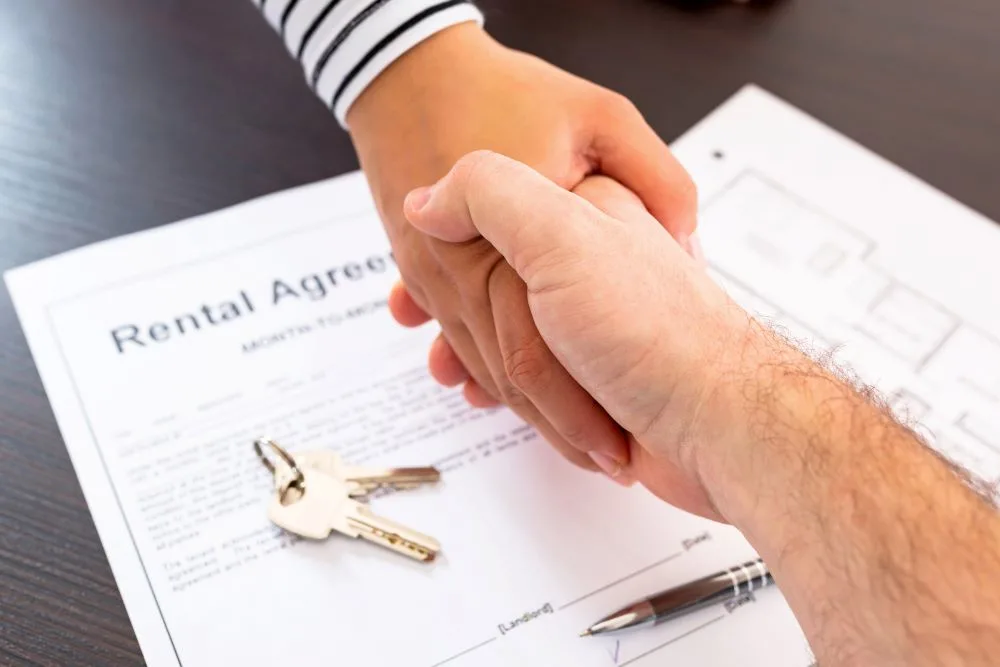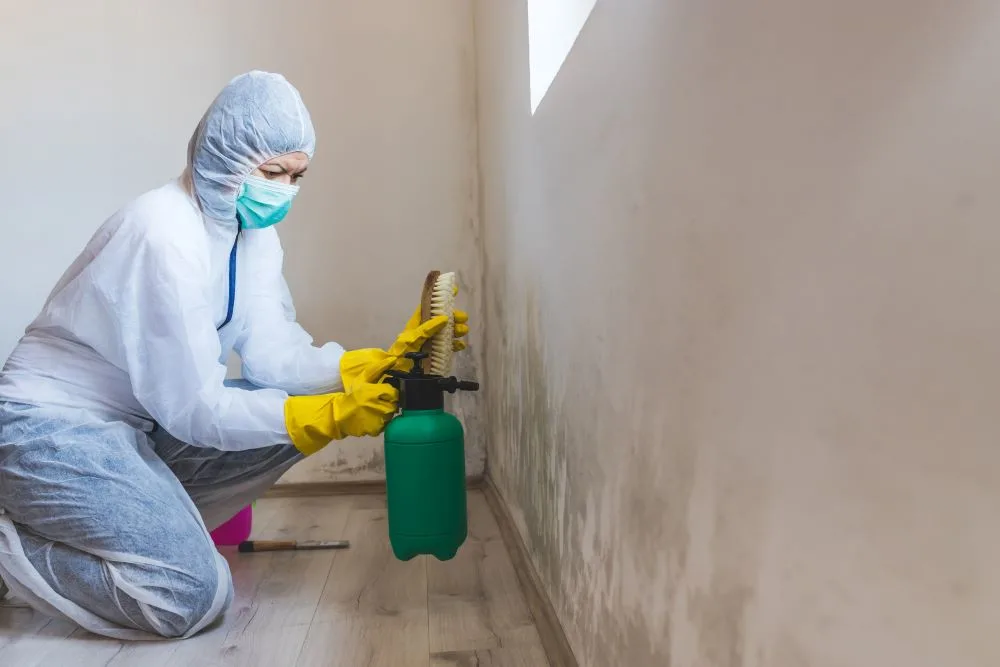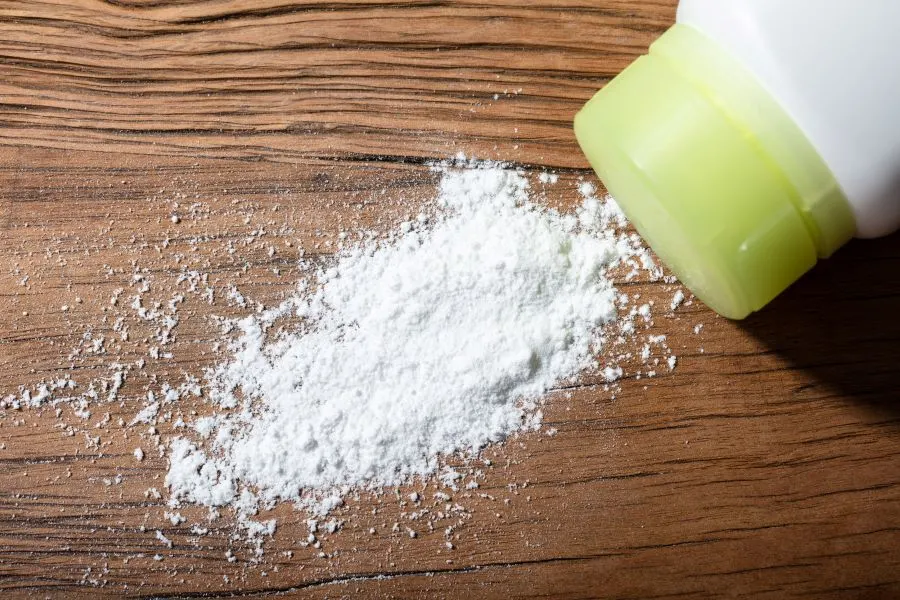Nothing makes you feel like an old cartoon villain like trying to avoid squeaky hardwood flooring. The difficulty comes when you are renting, and the landlord is not getting on board with getting the flooring fixed.
While I think it’s always a good idea to participate in ninja training, there are some alternative physical interventions or additions to walking quietly in your apartment. The goal would be to have the landlord address the root of the problem, but if that isn’t happening, you can try and brace or pad the floor to decrease the noise.

A landlord is responsible for making repairs to the floor; however, this isn’t always a simple matter. In the meantime, utilize shims, talcum powder, nails, or rugs for temporary or non-invasive fixes to stop the boards from squeaking through bracing, lubrication, or sound dampening.
Try to Get Your Landlord to Fix It

In general, landlords are only responsible for repairing squeaky floors if the reason for squeaking is structural in nature, making the house/apartment uninhabitable. Occasionally, leases stipulate that all squeaks will be fixed. If downstairs neighbors sue, landlords may be compelled to take action.
Read the Rental Agreement
Your first port of call is to read through your rental agreement. Whether your landlord is responsible for fixing squeaky floors varies from case to case, and your lease may hold the answer to this question.
- Some leases will say that no matter the cause of the squeak, the landlord will repair it.
- Some say that the landlord will at least investigate the reason behind the noise and reserve the right to make repairs depending on the outcome thereof. So, if the squeaks are non-structural in origin, then nothing will be done, but if they are structural, then repairs will be made.
- Your rental agreement may stipulate that the landlord will fix squeaks if the tenant can prove reasonably that they are indications of danger to the tenant.
- Of course, there are many leases that will not mention squeaks at all. In such cases, you will have to approach your landlord and see where they stand on the matter.
- If they say that they will check it out to be safe, then great! But this also does not mean that they will fix it. They might be content to know that the squeaking is not dangerous and have no motivation to address the issue further.
- Should they tell you that the squeaking is normal, irrespective of proof thereof, then it will be up to you to prove that it is not, which will likely cost you.

If, after reading through your rental agreement, you are still unsure if squeaky floors are covered, then if you are wondering if squeaky floors are covered. If the wordy document leaves you confused, give your landlord a call to get a concrete answer for your situation.
If your landlord is the type of person who will just deny responsibility regardless of what the lease actually says, you can investigate the cost of legal advice to see if this is a viable option for you.
Landlords Must Make Apartment Habitable
While squeaky floors can certainly be a nuisance to the tenant and downstairs neighbors, not all squeaks indicate that the floor is structurally unsound. In fact, more often, it is the result of loosening boards in the subfloor and weather-related changes.
Landlords certainly have a responsibility to fix things in a rental. However, they are typically only responsible for the repairs necessary to maintain the structural integrity of a home and make it habitable. This may or may not include squeaks, depending on the cause of the squeak.
If your rental agreement says that the landlord will not be responsible for fixing squeaking floors, but you can prove that the squeaks indicate an issue that poses a risk to safety, then you can probably bring legal action against the landlord and get this stipulation overruled.
Why Are the Floors Squeaking?
The House Is Just Old
Old homes are notorious for having squeaky floors as the subfloor comes loose over years of wear. This does not mean that there is structural damage to the home.
If you knowingly moved into an old, creaking house, then you cannot expect the landlord to fix squeaking floors when the charm wears off and they start to grate you.
When you put your signature on the lease, you agree to the rental terms and have agreed that the apartment is acceptable as is. Signing a lease on an old home is usually agreeing to some floor squeaking.
The Floor Suddenly Started Squeaking
If you moved into a home with no squeaking floors, and then, after a few months, the floors start creaking like those of a 100-year-old house, then you should definitely contact your landlord. The sudden onset of squeaking can be an indicator of serious issues.
The landlord may even appreciate the information as your house or apartment is their investment.
However, sudden creaking can also occur due to something simple like the weather, so consider whether it seems to get worse during the dry, cold season. If so, investing in a humidifier might help your case.
New Construction Squeaking
It’s a huge headache of a scenario, but sometimes it happens. You move into a newly built house expecting it to be clean, quiet, and pristine, and suddenly squeaking floors breaks your tranquility.
However, since it is a new build, the landlord will be more likely to want to and be able to fix the issue. Even if the squeaking is not structural in origin, a new house should not be squeaking, and will likely still be covered under construction warranty. So, if you moved into a new house/apartment and the floors are squeaking, you can inform your landlord.
They will then try to get the builder to fix it if the warranty does not exclude it. If the landlord is not responsible for the cost, they might be more likely to put in the effort to get it sorted.
Are There Signs of Deeper Issues?
In uncommon cases, squeaking floors can be a sign of a deeper, more problematic issue affecting the structure of the home. Some things to watch out for are if the floor sinks, smells musty, or if there is mold visible along the walls and baseboards.

These are signs and symptoms of water-damaged flooring. Consider if there is a source of water near where the floor squeaks worst. This could be a vent or a leak of some sort.
Water damage can slowly disintegrate the structure of the floor as well as provide a breeding ground for mold and termites, which can damage the floor further and create an unsafe living environment.
You Can Pay for an Inspection
If you are very troubled by the squeaking, but there are no other obvious signs of a deeper issue, you can pay a professional, or preferably more than one, to come out and inspect the floors.
If the inspectors say it’s normal squeaks, you have no argument to make to your landlord to fix them. The landlord won’t have to fix the superficial issue.
However, if the inspectors express concern regarding the structural integrity of the floor, then your landlord will be forced to, at least, investigate and do their own research to ensure that they aren’t liable for renting out an unsafe home. Structural issues also mean they will likely have to pay for the repairs.
A home inspection will come at a cost to you, likely an hourly rate for whoever you are having come check out the house plus the cost of the report. However, if the squeaking floors seem concerning, it may be worth it for your peace of mind to get them inspected.
Your Best Bet: Shims
The floor can be squeaking because there are loose floorboards. An easy way to help with this, without repairing the causative structural damage, is to use shims.
Shims are wedges of wood (or other material) that act as a spacer or support. Using these on the floor would brace the wooden planks and secure them to prevent the creaking that occurs when they shift.
If you have access to the subfloor, you will need a buddy to help you locate the squeaky section from below. Be careful to make sure that it is safe to enter the space, and don’t forget to take a torch!
You will need to locate the section of the floor where the boards are loose and then glue the shims into place. You can also use caulk to help fill in larger gaps.
Gently insert the shims between the planks and the joists, where there are gaps. Be careful not to be too rough and create bigger gaps, and it might be helpful to check that the shims are placed where they help the squeaking before removing them and reinserting the plank with a bit of wood or carpenter’s glue.
It doesn’t involve a lot of work, but there are a few things you will need for the project:
Use Talcum Powder in the Cracks
When the wood floor rubs on the joists underneath, the resulting friction creates the creaking you hear as you walk across the spot.
Talcum powder is a good way to temporarily lubricate the floor if the squeaking comes from the wooden planks rubbing on the joists. The powder getting into the floorboards will help reduce the noise by reducing friction.

All you need to do is get some talcum powder, like the Fasco Epoxies Inc Pure Talc Powder Quart (amazon link), and then you sprinkle this onto the floorboards and walk it into the floor. Repeat this until you notice a decrease in the squeaking.
If you are worried about tracking powder footprints through the house or slipping, just place a towel over the area while the powder is being walked in.
Although this is temporary, you can also repeat the whole process over and over to keep the squeak away until the landlord can address the problem. So, don’t be shy about how much talcum powder you purchase!
Replacing Nails
Important note: do not do this without receiving written permission from the landlord first!
If the floor is squeaking because of loose or missing nails from the floorboards, you might be able to take care of it. Check your rental agreement and apply for permission from your landlord. This would require you to get under the floor and feel the nails around the squeaking area. Any missing or loose nails can be replaced.
Hammer the nails through the floorboard and into the joists. This will secure the boards back into place.
For a more secure job, use screws.
Use Carpeting/Rugs to Mask the Sound
Using carpets or rugs is not a way to fix the squeaking, but it can certainly help to dampen the sound. The same way that carpeting and rugs can muffle footsteps, they can also muffle the noise of squeaking hardwood.
It is a good option for rentals where you are limited in what you can do aside from telling the landlord it needs to be addressed.
You can also add rug pads, such as the Vellax Non-Slip Rug Pad Gripper (amazon link), which will help prevent the rug from slipping around the wooden floor and add an extra layer of padding to help dampen the squeaks.
Sources
https://kitchencabinetkings.com/glossary/shim/
https://cameronthesandman.com/why-do-my-hardwood-floors-squeak-mi-hardwood-flooring-services/
https://lvflooring.ca/7-great-tips-for-fixing-squeaky-hardwood-floors/
https://www.realtor.com/advice/home-improvement/how-to-fix-squeaky-floors/
https://soundproofinglab.com/best-rug-pads-for-soundproofing-floors-in-2021/
https://www.nolo.com/legal-encyclopedia/renters-rights-minor-repairs-30276.html



